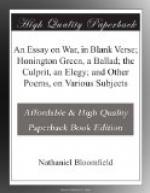spring
Of new-born joys, and each expanding heart
Contemplates future scenes of Peace and Love.
Long, even as long as room and food abound,
They interchange their friendly offices
For mutual good; reciprocally kind:
And much they wonder that they e’er were foes.
Still War’s terrific name is kept alive:
Tradition, pointing to the rusty arms
That hang on high, informs each list’ning youth
How erst in fatal fields their Grandsires fell;
Childhood attentive hears the tragic tale;
And learns to shudder at the name of War.
Gunpowder! let the Soldier’s Pean rise,
Where e’er thy name or thundering voice is heard:
Let him who, fated to the needful trade,
Deals out the adventitious shafts of Death,
Rejoice in thee; and hail with loudest shouts
The auspicious era when deep-searching Art
From out the hidden things in Nature’s store
Cull’d thy tremendous powers, and tutor’d Man
To chain the unruly element of Fire
At his controul, to wait his potent touch:
To urge his missile bolts of sudden Death,
And thunder terribly his vengeful wrath.
Thy mighty engines and gigantic towers
With frowning aspect awe the trembling World.
Destruction, bursting from thy sudden blaze
Hath taught the Birds to tremble at the sound;
And Man himself, thy terror’s boasted lord,
Within the blacken’d hollow of thy tube,
Affrighted sees the darksome shades of Death.
Not only mourning groves, but human tears,
The weeping Widow’s tears, the Orphan’s cries,
Sadly deplore that e’er thy powers were known.
Yet let thy Advent be the Soldier’s song,
No longer doom’d to grapple with the Foe
With Teeth and Nails—When close in view, and in
Each-other’s grasp, to grin, and hack, and stab;
Then tug his horrid weapon from one breast
To hide it in another:—with clear hands
He now expertly poizing thy bright tube,
At distance kills, unknowing and unknown;
Sees not the wound he gives, nor hears the shriek
Of him whose breast he pierces.... Gunpowder!
(O! let Humanity rejoice) how much
The Soldier’s fearful work is humaniz’d,
Since thy momentous birth—stupendous power.
In Britain, where the hills and fertile plains,
Like her historic page, are overspread
With vestiges of War, the Shepherd Boy
Climbs the green hillock to survey his flock;
Then sweetly sleeps upon his favourite hill,
Not conscious that his bed’s a Warrior’s Tomb.
The ancient Mansions, deeply moated round,
Where, in the iron Age of Chivalry,
Redoubted Barons wag’d their little Wars;
The strong Entrenchments and enormous Mounds,
Rais’d to oppose the fierce, perfidious Danes;
And still more ancient traces that remain
Of Dykes and Camps, from the far distant date
When minstrel Druids wak’d the soul of War,
And rous’d to arms old Albion’s hardy sons,
To stem the tide of Roman Tyranny: ...
Of new-born joys, and each expanding heart
Contemplates future scenes of Peace and Love.
Long, even as long as room and food abound,
They interchange their friendly offices
For mutual good; reciprocally kind:
And much they wonder that they e’er were foes.
Still War’s terrific name is kept alive:
Tradition, pointing to the rusty arms
That hang on high, informs each list’ning youth
How erst in fatal fields their Grandsires fell;
Childhood attentive hears the tragic tale;
And learns to shudder at the name of War.
Gunpowder! let the Soldier’s Pean rise,
Where e’er thy name or thundering voice is heard:
Let him who, fated to the needful trade,
Deals out the adventitious shafts of Death,
Rejoice in thee; and hail with loudest shouts
The auspicious era when deep-searching Art
From out the hidden things in Nature’s store
Cull’d thy tremendous powers, and tutor’d Man
To chain the unruly element of Fire
At his controul, to wait his potent touch:
To urge his missile bolts of sudden Death,
And thunder terribly his vengeful wrath.
Thy mighty engines and gigantic towers
With frowning aspect awe the trembling World.
Destruction, bursting from thy sudden blaze
Hath taught the Birds to tremble at the sound;
And Man himself, thy terror’s boasted lord,
Within the blacken’d hollow of thy tube,
Affrighted sees the darksome shades of Death.
Not only mourning groves, but human tears,
The weeping Widow’s tears, the Orphan’s cries,
Sadly deplore that e’er thy powers were known.
Yet let thy Advent be the Soldier’s song,
No longer doom’d to grapple with the Foe
With Teeth and Nails—When close in view, and in
Each-other’s grasp, to grin, and hack, and stab;
Then tug his horrid weapon from one breast
To hide it in another:—with clear hands
He now expertly poizing thy bright tube,
At distance kills, unknowing and unknown;
Sees not the wound he gives, nor hears the shriek
Of him whose breast he pierces.... Gunpowder!
(O! let Humanity rejoice) how much
The Soldier’s fearful work is humaniz’d,
Since thy momentous birth—stupendous power.
In Britain, where the hills and fertile plains,
Like her historic page, are overspread
With vestiges of War, the Shepherd Boy
Climbs the green hillock to survey his flock;
Then sweetly sleeps upon his favourite hill,
Not conscious that his bed’s a Warrior’s Tomb.
The ancient Mansions, deeply moated round,
Where, in the iron Age of Chivalry,
Redoubted Barons wag’d their little Wars;
The strong Entrenchments and enormous Mounds,
Rais’d to oppose the fierce, perfidious Danes;
And still more ancient traces that remain
Of Dykes and Camps, from the far distant date
When minstrel Druids wak’d the soul of War,
And rous’d to arms old Albion’s hardy sons,
To stem the tide of Roman Tyranny: ...




